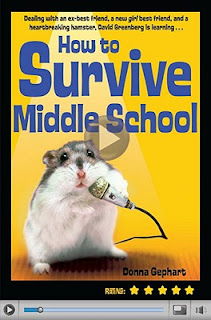Now that I’ve sold three novels, I wish I could talk to myself when my first book came out. I’d tell myself:
“Stop freaking out! People will read the book. You will get amazing e-mails from young fans, teachers, librarians and old boyfriends. You will even win a couple lovely awards.”
To you, dear reader, I say, “Do what feels comfortable. Say, “Yes” a lot. Let people know about your book and about you as a speaker, then move on and write the next book. If contemplating marketing and promoting gives you hives, think about the process as connecting and giving.”
Here are some examples from my experience that may be helpful:
School Visits:
When a friend told me a local middle school library was desperately in need of books, I gathered a bag of books our kids were not using as well as copies of my two novels and headed over there.
The librarian and I hit it off immediately. She was friendly and enthusiastic and really appreciated the donation of books. When she found out I did school visits, she invited me to give a (paid) presentation to the entire sixth grade class (about 400 students) and sign books at the school’s book fair.
A win for both of us.
Since that time, I’ve gone in to help her encourage reluctant readers to find books they’ll enjoy.
Media Attention:
A friend, Janeen Mason, suggested I contact her friend, Marilyn Bauer, who writes a local arts column blog for an area newspaper.
Marilyn is lovely! After she wrote about me, a reporter from that paper read my novel, How to Survive Middle School, enjoyed it and wrote a review in the newspaper, saying my book was good for both children and adults. (He even posted the review on Amazon.)
A parent read that review and told her group about me when they were looking for a keynote speaker for an event they were hosting. I spoke to that group about surviving parenting a middle schooler.
Another time, I wrote to a local reporter, telling her how much I enjoy her weekly “Meet Your Neighbor” feature. I’d been reading and enjoying it for years. The reporter asked if I’d consider being featured in the newspaper.
Of course I agreed.
After that article came out, I was contacted by several area schools about author visits.
Blogging:
I’ve been blogging since 2007.
A favorite feature is my 6-1/2 list – a cleverly disguised guest blog. Here are a few examples:
1. Erin Murphy and author Audrey Vernick give great tips about how to elevate quiet books.
2. Cynthia Leitich Smith discusses How to Promote Your Book Like a Pro
3. Cynthia Lord shares tips on creating great school visits.
Don’t blog in a vacuum. Follow and comment on other blogs. Doing guest blog posts is a great idea because it gives you the opportunity to connect with new readers. Thanks, Robin!
Your Book is Your Best Promotion Tool:
When you hear the advice, “Write the best book you can,” there’s a reason. Once your book comes out, it must stand on its own merits. Take my word for it, you’ll be glad you spent that extra time revising.
My first book, As if Being 12 ¾ Isn’t Bad Enough, My Mother is Running for President! had a lot of support from Random House. They flew me to Philadelphia to meet with influential librarians at a cocktail party during ALA. They promoted the book in print. They even gave out “Vote for Mom” buttons at a few large shopping malls across the country.
With all that support from Random House plus all my promotional efforts, the book did NOT break any sales records.
But instead of spending all my time and energy promoting that book, I did exactly what I was supposed to do. I wrote the next book.
ARCs of How to Survive Middle School were sent to reviewers by Random House. That’s it. I sent out an e-mail letting people know my book was out. And not a whole lot more.
Guess what?
How to Survive Middle School got starred reviews right out of the gate. It landed on the Texas Lone Star Reading List.
Before long, I got the happy news that it had gone into its FIFTH printing and sold out its advance. And it hasn’t even been out a year.
That had very little to do with what I or Random House did to promote it.
It was the book not than the promotion that made those things happen.
So, here are my 6-1/2 tips for you:
1. Write the best book you can.
2. Spend as much time as needed to revise and polish your book.
3. Instead of thinking about what you’d like to get (book sales), think about what you can give -- your time, advice, expertise, etc.
4. Connect in ways that feel comfortable and meaningful. Blogs, FB, Twitter, school visits, library workshops, articles for magazines – whatever works for you.
5. Don’t be shy. Let your friends, family and colleagues know about how excited you are about your new book. Give out your business cards liberally. Include your book and Web site/blog information in your signature line on every e-mail you send out.
6. If you’re introverted, get thee to Shrinking Violet Promotions. (Ha! We didn't even pay her to say that!)
6-1/2. Here’s the most important advice. My agent reminds me of it every now and again. Don’t get so caught up in worrying about sales and marketing and promotion that you neglect to do the most important thing for a long, healthy writing career: WRITE THE NEXT BOOK.
Donna Gephart tries to remember to WRITE THE NEXT BOOK from her home in South Florida. Her newest book, Olivia Bean, Trivia Queen, about a girl determined to get on the TV quiz show, Jeopardy!, comes out in 2012. Visit Donna online at www.donnagephart.com.




